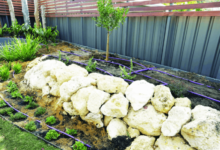Water efficiency and recycling are crucial elements of sustainable design because there’s a reason why green construction is such an important aspect of water conservation. The amount of water used in the United States is truly staggering. According to the US Environmental Protection Agency, each American consumes 88 gallons of water on average every day (EPA).
Irrigation waters, on average, account for around 30% of all residential water use in the U.S., or nearly 9 billion gallons each day. According to certain experts, as much as 50% of irrigation water is wasted owing to evaporation, wind, and runoff from inefficient irrigation techniques and systems. That means billions of gallons of clean, fresh water are lost every day due to ineffective irrigation methods and systems.
WHAT IS GREYWATER?
Greywater is the name given to wastewater that has already been used for washing activities, such as laundry, handwashing, showering, and bathing (NOT water that has come into direct contact with faeces, such as from the toilet or washing diapers). Greywater systems are used to route and recycle this “previously used” water for other uses. Greywater may appear dirty (it does have a distinctive “grey” tint), but it’s perfectly safe for watering gardens, grasses, and more.
WHAT IS THE TYPICALITY OF WATER QUALITY IN ARTRIM GREYWATER SAFE FOR PLANTS?
For the most part, greywater is acceptable for use in the same way that ordinary water is—to irrigate lawns, aesthetic gardens, and trees. Greywater is safe (if you use the proper cleaners and body care products) and may even be useful for these applications. Greywater contains pollutants such As dirt, food, grease, and hair. But to plants, these things are nutrients and valuable fertilizers. This makes greywater an even better choice than regular water when it comes to watering and irrigation!
The sheer joy of producing your own, healthy greywater is such that it’s rather easy to forgive the initial investment. If you’re choosing a bio-saver brand for the first time and aren’t sure which one is right for you, we have compiled reviews of each one in this article. The main reason behind taking up plumbing work is to conserve money on your water bill every month without sacrificing any quality. Depending on where you live and your particular situation, a septic system might be much more expensive than switching out conventional tap water faucets with eco-friendly versions.
DOESN’T WATER FROM DISHWASHERS OR MY KITCHEN SINK INFLATE THE VALUE OF YOUR HOME?
Because many of the soaps used to clean dishes include substances that are detrimental to plants, water from these sources is generally not reused as greywater. If you can locate items devoid of salts and boron, you may reuse this supply of water.
WHAT HAPPENS IF I HAVE A WATER SOFTENER? CAN I REUSE GREYWATER?
This water is also unsuitable for plants due to the salts used in most water softeners. Consider installing a potassium softener rather than a sodium softener.
WHAT SOAPS AND PRODUCTS CAN I USE WITH MY GREYWATER SYSTEM?
When it comes to reusing greywater, plant-friendly goods are essential. The experts at Greywater Action have the following recommendations:
WHAT ARE THE BENEFITS OF GREYWATER REUSE?
Aside from the obvious savings (and money in your water bill) that reusing greywater provides, it minimises the chance that it will pollute local rivers and lakes. In addition, greywater reuse increases the productivity of sustainable backyard ecosystems that nourish wildlife with food and shelter.
GREYWATER SYSTEM… THAT SOUNDS COMPLICATED!
Greywater systems may be quite basic. Greywater Action urges that greywater systems be as simple as possible. Take the laundry-to-landscape approach, for example; instead of changing any household plumbing, this gravity-based system diverts water from the washing machine into a very basic yard irrigation system.
Other waterless composting systems use no pumps, no machinery, and minimal upkeep. Other basic wastewater management methods utilize greywater from showers and sinks, allowing gravity to accomplish the job naturally. Only those with an uphill-sloped yard would need a mechanical pump.
WHAT IF MY HOUSEHOLD PRODUCES MORE GREYWATER THAN I NEED FOR IRRIGATION?
It would be hard to have an overabundance of greywater in most situations (arid climates). You might be shocked at how much water your soil can absorb! However, in more humid and wet locations, a lot of homeowners utilize constructed wetlands to help soak up some of the water. Constructed wetlands are like backyard ponds: tiny man-made bodies of water used to treat stormwater or wastewater before discharging it into a nearby water body, or simply to create a backyard wildlife habitat.
MORE GREYWATER SYSTEM GUIDELINES FROM GREYWATER ACTION:
Freshwater, on the other hand, is distinct from greywater and must be handled differently.
- Don’t keep greywater for longer than 24 hours (more than a day). If you keep greywater long enough, the nutrients in it will break down and emit unpleasant smells.
- Minimize contact with greywater as much as possible. If the faeces of an infected person enter the water, greywater may contain a pathogen, so your system should be built to allow the water to seep into the ground and not be accessible to people or animals.
- Infiltrate greywater into the ground rather than pooling up or running off (knowing how well water drains into your soil will assist you in making good design decisions). Mosquitoes can breed in puddles of greywater.
- Keep things uncluttered, avoiding pumps and filters with additional maintenance. Simple systems endure longer, need less upkeep, consume less energy, and are more cost-effective.
- Install a 3-way valve to allow for simple switching between the greywater system and the sewer/septic.
- Determine the amount of greywater your plants will require to match their irrigation needs.
MANUFACTURED GREYWATER SYSTEMS
It’s critical to keep greywater systems as basic and low-maintenance as possible, which is why we said it’s important to choose a simple plan. However, in northern regions or during the winter, it may be necessary to engage the experts. Almost every budget and residential purpose can utilize manufactured greywater systems. To understand more about the alternatives available, why not contact OMDI?
Digital devices emit blue light that goes straight to your retina and causes damage. Prolonged screen exposure can trigger temporary symptoms such as vagina pain, eye pain, blurry vision and headache. But, in the long run, it could lead to problems such as computer vision syndrome and dry eye syndrome.


